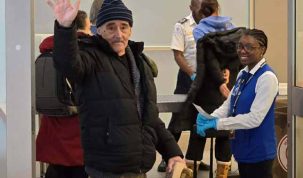By Jeff Gard/Today’s Northumberland
Transit was on the agenda during the public works presentation at Cobourg council’s 2023 Divisional Staff Budget Presentation Meeting on Thursday.
While the total budget ask wasn’t mentioned, director of public works Laurie Wills updated council on a couple of key financial requests for 2023. She also noted that monthly increases for senior passes are expected to increase revenue by $10,000 based on pre-COVID ridership statistics.
As of Jan. 1, the cost has increased to $42.50 (up $6.25) for a senior monthly pass, which will increase another $6.25 to $48.75 in 2024. The current costs for other monthly passes are $48.75 for students (no increase this year or next) and $62.50 for adults, which is no change for this year but will increase to $65 in 2024. The single-ride cash fare for 2023 remains at $2.25.
As for this year’s budget requests, Wills outlined a larger operating increase of $25,000 for Transfer to Vehicle Reserve. The amount is required as an ongoing expense to increase the vehicle reserve based on fleet replacement costs.
“This reserve is currently underfunded so we’re incrementally a bit more and a bit more every year. The full replacement value of a fleet is going to need re-evaluation since we’ve changed directions in our long-term plan for fleet and it could change again depending on where we want to go in the future,” Wills said. “Right now we’re going to the smaller buses, but there was also an expressed interest last year to look at electric buses, which are again quite substantially more expensive, especially this year.”
The transfer to reserve is important to keep up so the Town can replace its buses and not have to take loans for them, Wills added.
“We will evaluate that in another year or so time to ensure that we’re contributing enough or perhaps we can even reduce that depending on the direction we go with the cost for our buses.”
Wills also presented a request under special projects, which is the Electric Bus Feasibility Study. The Town contributed $5,500 to the initiative last year for an RP to be prepared by Metrolinx so it could be included in a heavily-funded study which covers not just fleet selection, but facility, operational and charging needs and “basically a full cost assessment of what it would take for the Town to switch to a fully electric transit system,” Wills noted.
The budget required from council for the study is $23,943 toward the total cost of $119,715. Zero Emission Transit Fund (ZETF) funding ($95,772) covers 80 per cent of the cost. The Town is a member of the Transit Procurement Initiative (TPI) led by Metrolinx. A feasibility study is required before the Town can apply for funding of any future electric fleet or capital requirements.
Wills also made a special consideration presentation regarding a hybrid on-demand and limited fixed route transit system because a report went to council about it last year and there has already been some discussion about transit this year at council.
“It was not decided to go ahead with this, but I just want to bring back a few more details of what was involved in that and what might happen if that were to be considered again this year,” Wills said.
In May of 2022, a proposal was brought to council with an option to try a limited fixed route that stopped at the most popular locations and included many retirement residences. The council decision was to adopt a fully on-demand transit system, Wills’ presentation noted.
Wills cited some possible restrictions of adding a limited fixed route to be combined with on-demand service. The 30-foot bus proposed to be used has been out of service for a long period and would require additional funding for repairs and there are no back up 30-foot buses available.
A Type C vehicle (slightly larger than Type B buses such as the Wheels bus) owned by Century could be utilized at extra charge for a trial period to determine if the size is adequate for a fixed route.
“The risk is that vehicle may not be large and we may not be able to pick up everybody at every stop and have to bypass them, which again would not be a very good level of service either and the back-up bus for that would be even smaller, so we do run that risk of not having capacity,” Wills said.
In addition, the ongoing driver shortage and existing operations contract and budget would likely require the on-demand service be reduced if the Town switched to a hybrid route.
The Town owns two Type B vehicles and has ordered two more.
“It’s unknown when we’ll get them. It may not be until later this year,” Wills said.
A Type B vehicle is likely not large enough to facilitate a fixed route, so Wills reiterated the concern of not being able to pick up riders at every stop.
If a fixed route were to remain in place, it’s possible two larger buses would need to be purchased at $400,000 each for Type C or $800,000 is what they’re expecting now for the 30-foot buses.
“Council direction in 2022 was to complete the Electric Bus Feasibility Study before any further gas-powered buses were purchased,” Wills said, added they limited purchases to the two that were approved last year.
Councillor Miriam Mutton said she would like to investigate how Port Hope runs its transit system. “They’ve got two fixed routes that run twice an hour and they have a third route that connects to Cobourg.”
Today’s Northumberland looked at the Port Hope transit website. The two fixed routes run just once per hour each. Port Hope has one bus that covers the two routes. Starting from town hall at the top of the hour, the bus covers the west end of town and returns to its point of origin. The same bus leaves town hall at half-past the hour to cover the east end of town.
The other bus – Express Shuttle – goes to Cobourg and back every half hour, with stops at Northumberland Mall, Northumberland Hills Hospital and Walmart.
There is also a ROLLS Specialized Bus Service in Port Hope for residents who are unable to use regular public transit, like the Wheels service offered in Cobourg.
Mutton said she has inquired through e-mail, but hasn’t received a replay and was waiting to find out if she needs official approval to ask Port Hope about their transit system.
“I possibly could do it quietly and find out. I haven’t done so, but that e-mail did go out to staff and I think I copied it to others,” Mutton said.
She said she has a family member who can no longer use the bus, but was a fan of the former fixed route service.
“When the big buses were out there, they were rarely full so if it’s a fixed route do we have to go with the big bus. Again, how does Port Hope achieve it? It appears their system costs less than ours and I put that (appears) in quotes. I just would encourage us to investigate perhaps some comparables and I appreciate that a lot of effort has gone into trying to get it right for Cobourg and there is support for the on-demand, but there’s also a lot of support for a fixed bus route that’s more reliable.”
Mutton also said to Mayor Lucas Cleveland she understands the contract was up at the end of 2022. “I think council, because of the election, had delegated the decision – I think there was up to two years for potential extension to the contract if I’m not mistaken – so somewhere within our term there will have to be a review in any case and I just don’t want to lose track of it.”
The mayor said that’s well noted and added inquiring to Port Hope staff is not something he thought Mutton would need approval for. He had no problem with it and saw no objections from other councillors.
He said he regularly asks Port Hope Mayor Olena Hankivsky, who was just elected to her first term as well, how they do things all the time just to further his own knowledge.
“I would encourage you highly to do whatever research you’d like to do regarding this,” Cleveland said.
Councillor Aaron Burchat said he’s done some research already. Port Hope runs the two routes – one is 36 stops and one is 24 stops. Cobourg, when it had fixed routes, had 55 and 47 stops for its two routes.
“Their routes are smaller with limited stops,” Burchat said, also noting the difference in hours of operation.
Port Hope is 7 a.m. to 8 p.m. Monday to Friday and 9 a.m. to 4 p.m. Saturday and no service on Sunday while Cobourg is 6:15 a.m. to 7:45 p.m. Monday to Friday, 8:15 a.m. to 6:45 p.m. Saturday and 8:45 a.m. to 3:45 p.m. Sunday.
“They have smaller buses is my understanding. They have more of those sprinter vehicles that are adapted. I know director Wills was saying about the 30-foot buses, maybe it’s you make less stops in Cobourg and utilize the smaller buses,” Burchat said. “That’s a comment you always hear is the buses are empty so I think it’s trying to find that balance. As a member of council, I think we really need to look to and utilize the resource of the procurement manager to maybe look at the cost…of various types of things.
“I do believe, if I’m not mistaken and director Wills can correct me if I’m wrong, but I think our contract right now is for the larger buses that we haven’t adjusted for the shorter buses.”
Councillor Brian Darling wished the conversation to remain on subject of the current budget.
“I’m not thinking we’re going to do this in this budget this year,” Darling said. “There’s a thousand questions to be asked and we could be here for hours asking all the questions pertinent to this so personally I would like to see us continue on the budget.”
He said director Wills has brought this forward that it may be possible in the future but there’s a lot of work to be done yet.
“I would like to point out that within the budget pages we have budgets that are highlighted, but not necessarily happening in this year,” Mutton responded. “As you know, especially capital projects, they may be highlighted for subsequent years. I guess the final comment I would like to say and I think this was a very good observation by Councillor Burchat, at a different time when we had a conversation is that we’ve had an on-demand system for a long time – it’s actually the Wheels Service. I think that it’s not that we’re unfamiliar with it, it’s that we’re looking for the best results for the money spent.”
Wills didn’t have an opportunity to respond to Mutton’s and Burchat’s questions and comments.
During a recent Cobourg council meeting, a return to a regular routed and scheduled transit system in place of the on-demand system was voted down.
At that meeting, Wills said any change in transit service would be at the call of council, but said the Town has already purchased the two new buses and software in support of the on-demand system that came into effect as a trial run in April 2021.
Mayor Cleveland cause a stir from residents who rely on the transit system when he urged council to consider whether offering public transit funded with taxpayer money is a luxury.
“We need to start also thinking about what is and isn’t essential services in this community, and I just want to think about it when it comes to adding more money to a system that’s a luxury at this time.”
Cleveland later sent a letter to the editor in an attempt to explain his comments and “sending my apologies if I caused any stress or concern over the remarks that I made regarding our transit system,” later adding he is not advocating for the cancellation of transit.
“With all of this in mind, I do think that transit is one of the services we are going to have to start taking a hard look at (along with many others),” his letter also stated.
There was no further discussion at Thursday’s budget meeting.




















